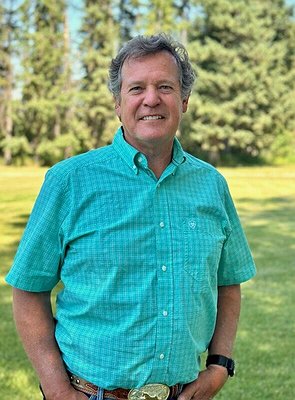Democrat Dave Fern faces Republican Doug Adams for newly drawn Senate district
KATE HESTON | Hagadone News Network | UPDATED 1 year, 2 months AGO
Kate Heston covers politics and natural resources for the Daily Inter Lake. She is a graduate of the University of Iowa's journalism program, previously worked as photo editor at the Daily Iowan and was a News21 fellow in Phoenix. She can be reached at [email protected] or 406-758-4459. | October 11, 2024 12:00 AM
Longtime Democratic legislator Dave Fern is hoping to return to the Legislature come 2025 in a newly redrawn Senate District 2 encompassing parts of the north Flathead Valley.
Fern has lived in Whitefish since 1988 and served as the representative for House District 5 from 2017 to 2024. A small business owner and former Whitefish School Board member, Fern’s legislative history is focused on bringing specific policies to Helena that can alleviate some of the burdens Montanans experience: increased property taxes, a broken behavioral health system and failing funding formulas due to high inflation.
Fern faces Doug Adams, a Republican, for the Senate district, which includes Whitefish, Columbia Falls, West Glacier, Essex, Olney and Polebridge.
Adams, a landscaper and vacation rental property owner in Whitefish, is making his second run for the state Legislature, previously losing in 2014 to Democrat Rep. Ed Lieser in the House District 5 race.
Originally from Georgia, Adams has been in the valley for 24 years. He was a member of Whitefish City Council for four years and serves on the Flathead County Library board of trustees.
Adams is focused on reducing government spending by halting the outflow of tax money into government programs.
Fern was appointed to two of Gov. Greg Gianforte’s interim legislative committees on property taxes and mental health. A veteran in the statehouse, Fern is known for his policy expertise and ability to work across the aisle to develop policy aimed at repairing broken systems.
“I would think first and foremost I’m interested in assuring that we can bring forward some of [the task force’s] recommendations for property tax reform and assuring that Montanans with developmental disabilities or behavioral health modalities have much improved services,” Fern said.
Fern is interested in improving housing inventory, getting housing prices down for essential workers and addressing the shortfalls that led to a high inflation rate. He also listed other solutions, some identified by the Montana Housing Tax Force of 2022, including low-income tax credits or deed restricted rent.
Adams, on the other hand, is unsure whether legislative action would benefit the state’s housing crisis. The government, rather, could be part of the problem. Adams suggested that housing issues should be handled at the local government level.
“Is the government really supposed to be the savior, the end all for all people? Is it supposed to solve everybody’s problems in every situation? Is it supposed to be your nanny? The answer is that’s not the way it was intended,” he said.
He also suggested letting the free market dictate housing prices and credited the TV show “Yellowstone,” in part, for increasing property prices in the state.
“You make it a desirable place and more people are going to come. That’s how it works... we should be accepting that we live in a desirable area, and this was bound to happen. It’s a natural consequence of life. And things happen, you don't have to then counteract what happens naturally in every situation,” he said.
One of Adams main priorities, if elected, is to stop taxing Social Security. Montana is only one of nine states that does.
“This is immoral,” Adams said. “...It’s idiotic.”
Adams also questioned income taxes on top of property taxes.
“The solution, in my opinion, is to quit spending money,” Adams said.
The government takes money from one group of people to give to another group, Adams said. He specifically cited social service programs like Medicaid.
A better solution would be to stop funding those services, therefore lowering taxes and putting more money into the pockets of citizens so that they “don’t have to rely on state government” programs, he said. Adams is not in support of renewing or expanding the state's Medicaid program.
Fern, who served on the governor’s Behavioral Health Commission, disagrees, noting that through the interim committee, he discovered how important Medicaid is to the state.
In Montana, 90% of the Medicaid program is federally funded, a higher contribution than all of Montana’s neighboring states. The other 10% comes from the state share, according to the Department of Public Health and Human Services.
“We are so tied to Medicaid,” Fern said. “... The need to have a strong Medicaid system, be it traditional Medicaid or Medicaid Expansion, is so important.”
The goal, Fern said, is to help the working class and alleviate the financial challenges and difficulties that exist at a heightened level. To do so, Fern said, people must be willing to cooperate with each other, regardless of party.
“People are kind of jaded and cynical that the moderates don’t exist anymore. I want to ensure folks... that moderation is pretty alive and well,” Fern said. “It just gets sort of stamped out in some degree.”
Adams admits that he may differ from some others in his party but ensures that his goal is to remain true to his own beliefs, not a party line.
“I by and large agree with most Republican positions, but I don't intend to be held to the party line. If I’m nothing more than an echo, then you don't need me there. I have my own thoughts and opinions, and I hope that I would vote accordingly... I just don't worship government,” he said.
The election is Nov. 5 and absentee ballots are mailed on Oct. 11.
Reporter Kate Heston can be reached at [email protected] or 758-4459.
ARTICLES BY KATE HESTON

Veteran-owned mobile boat repair service anchors down in the Flathead Valley
The Kramers launched Flathead Mobile Marine to use their skills — they have decades of experience performing routine maintenance checks on a variety of boats as well as working with engines and electrical systems — and help boaters in the community.

With ski season near, resort reaches deal with staff
After 18 months of negotiations, Whitefish Mountain Resort executives and the resort’s ski patrol union are finalizing a one-year contract for the upcoming season.

Trapped in a car wreck, Woods Bay woman credits teens with saving her life
Driving home from a quilting event in Bigfork in September of last year, Carol Martin remembered that the sky was clear, the sun was shining, and she had a headache.



